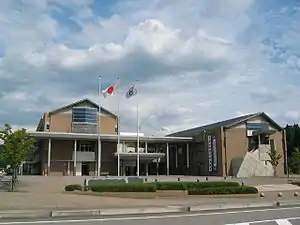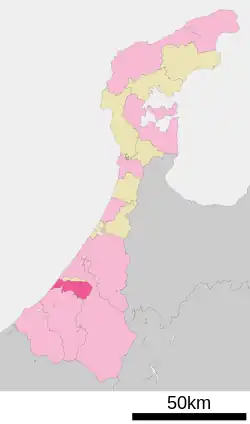Nomi
能美市 | |
|---|---|
 Nomi City Hall | |
 Flag  Seal | |
 Location of Nomi in Ishikawa Prefecture | |
 Nomi | |
| Coordinates: 36°26′49.2″N 136°33′14.7″E / 36.447000°N 136.554083°E | |
| Country | Japan |
| Region | Chūbu (Hokuriku) |
| Prefecture | Ishikawa Prefecture |
| Government | |
| • Mayor | Toshiaki Ide |
| Area | |
| • Total | 84.14 km2 (32.49 sq mi) |
| Population (March 1, 2018) | |
| • Total | 50,132 |
| • Density | 600/km2 (1,500/sq mi) |
| Time zone | UTC+9 (Japan Standard Time) |
| City symbols | |
| Phone number | 0761-58-1111 |
| Address | 110 Raimaru-machi, Nomi-shi, Ishikawa-ken 926-8611 |
| Website | Official website |
Nomi (能美市, Nomi-shi) is a city located in Ishikawa Prefecture, Japan. As of 1 March 2018, the city had an estimated population of 50,132 in 18,585 households, and a population density of 600 persons per km².[1] The total area of the city was 84.14 square kilometres (32.49 sq mi).
Geography
Nomi is located in southwestern Ishikawa Prefecture and is bordered by the Sea of Japan to the east.
Neighbouring municipalities
Climate
Nomi has a humid continental climate (Köppen Cfa) characterized by mild summers and cold winters with heavy snowfall. The average annual temperature in Nomi is 14.1 °C. The average annual rainfall is 2,527 mm with September as the wettest month. The temperatures are highest on average in August, at around 26.8 °C, and lowest in January, at around 2.7 °C.[2]
Demographics
Per Japanese census data,[3] the population of Nomi has recently plateaued after a long period of growth.
| Year | Pop. | ±% |
|---|---|---|
| 1970 | 32,933 | — |
| 1980 | 37,253 | +13.1% |
| 1990 | 39,934 | +7.2% |
| 2000 | 45,077 | +12.9% |
| 2010 | 48,680 | +8.0% |
| 2020 | 48,523 | −0.3% |
History
The area around Nomi was part of ancient Kaga Province and contains numerous Kofun period ruins. The area became part Kaga Domain under the Edo period Tokugawa shogunate. Following the Meiji restoration, the area was organised into Nomi District, Ishikawa. The town of Nomi was established with the creation of the modern municipalities system on April 1, 1889.
The modern city of Nomi was established on February 1, 2005, from the merger of the towns of Neagari, Tatsunokuchi and Terai.
Government
Nomi has a mayor-council form of government with a directly elected mayor and a unicameral city legislature of 17 members.
Economy
Former Terai town was a noted centre of Kutani ware ceramics production in the past. Manufacturing of electrical components and textiles are major contributors to the modern local economy.
Education
Nomi has eight public elementary schools and three middle schools operated by the city government, and one public high school operated by the Ishikawa Prefectural Board of Education. There is also one private high school. The Japan Advanced Institute of Science and Technology (JAIST Hokuriku) is also located in Nomi.
Transportation
Railway
Highway
Sister city relations
Local attractions
- Hideki Matsui Baseball Museum (ja:松井秀喜ベースボールミュージアム)
- Tedori Fish Land (ja:手取フィッシュランド)
- Tumulus Wada-yama and Matsuji-yama
- Tumulus Akitsune-yama - Keyhole-shaped tomb.
- Ishikawa Zoo (ja:いしかわ動物園)
- Tatsunokuchi Onsen (辰口温泉) - Spa.
Local events
- Asian Race Walking Championships, held annually
Noted people from Nomi
- Hideki Matsui, baseball player
- Yoshirō Mori, former prime minister
- Shigeki Mori, town mayor of Neagari - Mori was responsible for Neagari's sister town relationship with Shelekhov, Russia, developing a bilateral dialogue to improve the gravesites of Soviet soldiers in Japan and Japanese soldiers in Siberia. He visited Shelekhov more than 15 times during his 35 years in office, and was buried there following his death. His son, Yoshiro Mori, became prime minister and made major strides in Russo-Japanese relations.[4]
- Mamoru Sasaki, Japanese TV and film screenwriter
- Yusuke Suzuki, racewalker
References
- ↑ Official statistics page
- ↑ Nomi climate data
- ↑ Nomi population statistics
- ↑ Reitman, Valerie (28 April 2000). "Personal Element to Japan Premier's Russia Trip". Los Angeles Times. Retrieved 15 January 2014.
External links
 Media related to Nomi, Ishikawa at Wikimedia Commons
Media related to Nomi, Ishikawa at Wikimedia Commons- Nomi City official website (in Japanese)